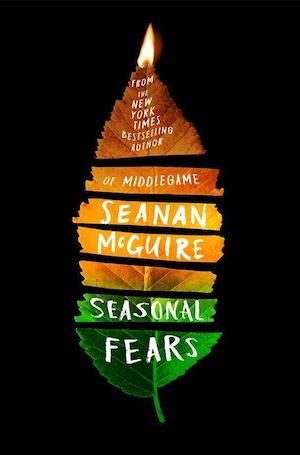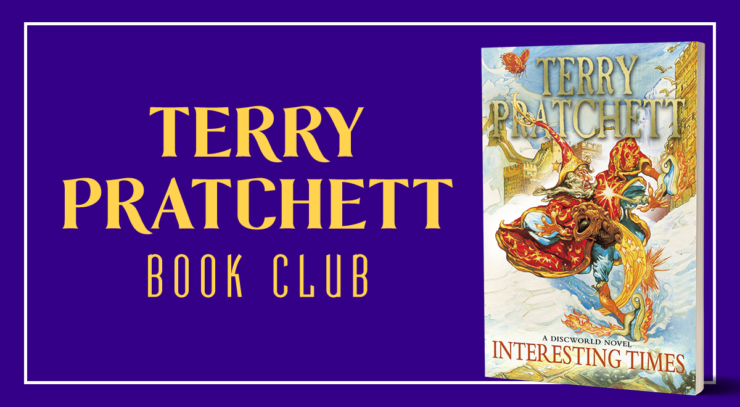Time to win a war of seven again a quarter million. Butterflies are on our side, though.
Summary
The Horde discuss what they believe the afterlife is going to be like because they’ve finally come to terms with the fact that they’re about to die. Saveloy insists they could run, but that’s not what they do. They invite him to take up a sword and join them which he agrees to do. Rincewind sees Twoflower and his daughters amongst the people lined up to watch the battle and tells them it’s not going to work out, despite Twoflower’s protestations that it must because it always does with Rincewind. The wizard rushes off and runs into the Luggage, who has taken this long to show up because it found itself a Luggage mate. The Silver Horde sees the army they’re about to fight. Cohen decides maybe they should talk surrender—he goes to Lord Hong and asks about his surrender. Lord Hong refuses, amazed that they would ask. Rincewind continues to keep escaping, getting into a conversation with a citizen and his buffalo, and moving on to stay out of Events. Lord Hong is arguing with the other warlords, who are ashamed to bring an army of a quarter million to fight seven men. Hong threatens them all into continuing.
Buy the Book


Seasonal Fears
Rincewind runs across some soldiers who are so far back in the assembly that they don’t think they’ll be missed, and keeps running. He slides into a gully, then down into darkness. He’s in a cave, precisely the sort of place he was intending to avoid. Within the cave is an army of seven foot clay soldiers. The battle is about to commence, the armies begin rushing toward each other, seven on two-hundred-fifty thousand… Rincewind is trying to find his way out of the cave, away from the clay statues, when a spark flares. On the battlefield more sparks flare. Rincewind finds a lever and pulls it. There’s a cloud of yellow butterflies preceding a terrible storm. Cohen insists this is their sign from the gods and they charge, and the army parts around them, then closes behind them, but no one knows what to do. Lord Hong forces everyone to step aside to bring samurai in to fight them; Cohen beads three of them by distracting them throwing a handkerchief up in the air. Lord Hong loses his temper, something no one has ever seen. Rincewind finds himself in a chamber with a mercury lake and sees the statue of One Sun Mirror, the original Agatean Emperor. At the foot of his statue is a helmet, gauntlets, and boots, which Rincewind begins to put on and discovers are magic.
Hex is whirring away and Ponder’s assistant is scared because it’s answering questions that haven’t been put to it yet. Ponder assumes the machine is gaining some sapience like magic book do, and sets about asking it to do the equation to get Rincewind back. Rincewind is in the process of learning how the armor works and finds that it controls the clay army, similarly to how golems work back home. Lord Hong is screaming at the soldiers to fire their cannons at the Horde, but just as he’s about to fire one himself, the ground caves in, and an army of clay soldiers begins to emerge. Confusion ensues, Hong retreats to the palace, Cohen insists that they follow him while everyone tries to figure out how to fight the red clay army. The people in the streets are enamored of them and they march through the city while the red army draws up behind them. The people believe that the Silver Horde has won, so Cohen decides that his first decree as Emperor is to stop people from kowtowing. One of the clay soldiers starts doing charades…
Rincewind has been controlling the army throughout the storm, as water pours in and armor starts to get funky and fritz on him. The weather suddenly clears and he’s found by Twoflower and company, who knew that the clay soldier doing charades had to be him. Twoflower lets him know what’s happened, and that Cohen wants to make him Chief Wizard to reward him if he likes. Rincewind is instantly suspicious that something terrible is going to happen, but is convinced to go get a bath and some fresh clothes while waiting for it. Twoflower suggests that perhaps Rincewind is due something nice in his life, and also points out that his life hasn’t been all that bad to begin with, citing all that fun they had when they were younger. Lord Hong and a small group of his men appear and take Rincewind hostage, so Twoflower runs to get Cohen’s help. Lord Hong and Cohen square off, with Hong insisting that Rincewind’s death will prove he became Emperor by trickery and ruin him—but Rincewind suddenly disappears. Twoflower steps forward and tells Hong he wants to fight him (turns out that Hong is responsible for his wife’s death). Lord Hong is happy for the chance to kill Twoflower and make an example of someone when the cannon that exchanged places with Rincewind in the first place lands right on top of him, killing him and Mr. Saveloy instantly. Saveloy is carried to the barbarian afterlife by a valkyrie.
Twoflower is appointed Grand Vizier by Cohen and finds that the Luggage and its mate have made little Luggages. The gods relax and the Lady insists that she never sacrifices her pawns in games because she doesn’t play to win. The wizards are concerned because the thing they got back wasn’t Rincewind (and was also traveling at 500 mph)—it was a giant rat from XXXX, where they’re pretty sure Rincewind wound up. They decide to leave him be. Rincewind comes to on XXXX and the locals hand him a boomerang that he tries to toss away, believing it’s another call to adventure—
Commentary
The thing is, while I understand that this book is supposed to be a general East vs. West conceit, it’s… not. I mean, Ankh-Morpork isn’t all of the West, it’s mostly London, with a little New York flavor now and then, for the most part. But the Agatean Empire is… all of the East. Which comprises so many different cultures, and Pratchett’s just doing mostly China and Japan? But that doesn’t change the fact that tensions between England and China and England and Japan are incredibly different beasts, so to speak. So in some ways this story is clever, but when we get to asides about sumo wrestlers and samurai, my brain just kinda clocks out. It’s just a shame because while I understand the desire to use samurai (western audiences really do love them), Chinese cinema had picked up enough globally at this point that there were plenty of elements Pratchett could have overlaid here without resorting to mushing all of the East together. Even using Hong Kong cinema tropes for the fights would have been marginally better here, I feel like…
On the other hand, the use of the red army as a fantasy conceit is fun and also dates the book pretty specifically—the Terracotta Army was unearthed in 1974, with the first exhibition of statues showing up in 1982. From about that year on, for the next two decades or so, this was the thing that the western world heard about China—the unearthing of this incredible site and all the artifacts within it. The talk of a mercury lake was part of the legend (though I believe they were supposed to be rivers) of what this underground city looked like, I remember seeing specials that gave 3D renderings of the environment. So this would have been familiar to most people picking up the book, unless they really loathed museums and archaeology and world history for some reason.
Again, though, it seems as though the story starts out with a lot to say about the East v West dynamic in the story, and then it… peters off entirely. Which makes the book weaker overall to my mind. What saves it is ultimately Rincewind doing what he does best, and Twoflower’s excellent step up there at the end. I wish that moment have been given more room, but it was still meaningful getting to see him actually get upset about something, to find out what could actually make the man angry. We just deserved to see more of him because this is a pretty sizable retcon on a character who suddenly has so much more in his background than we were initially given.
Also, I thought not enough attention was paid to Lord Hong and his desire to… become a part of Ankh-Morporkian society? Obviously that’s a thing that some people want, the desire to assimilate into a different culture and/or take it over, but it feels weird that it’s only done from the Agatean side of things, and also that we’re not really given much sense of why this matters so much to Hong aside from a general sense of superiority.
Trying to explain how the Luggage got together with another Luggage brings the story to a discussion of whether or not the Luggage and any prospective partner could have a gender, which ultimately leads to a vote on Rincewind’s gender/sexuality. I’m just saying, there’s really no better way of announcing that a character is agender and asexual than: “He wasn’t certain what unisex was, but expected that it was what he normally experienced.” I mean, that has to be what he’s thinking there, right? He’s sort of incidentally male (for the sake of wizarding) and incidentally not really very interested in sleeping with people (for the sake of mashed potatoes). I love that for Rincewind. It’s all very Bilbo Baggins of him—a character who he has a lot in common with, now that I think of it.
He winds up in Discworld Australia, which, aside from getting hit in the head with a boomerang he tossed, isn’t a bad situation for him. So I suppose that this is where we leave him for now, as is always the case. Nice of Ridcully to leave him alone for once.
Asides and little thoughts:
- Given everything that’s been happening lately, Rincewind’s description of democracy being “some want you to run the country, or at least to let them run the country while telling you it’s you doing it really” is kinda too on the nose for me right now.
Pratchettisms:
“What d’you think this is, homeopathic warfare?”
Capacity for violence, Rincewind had heard, was unisexual.
Authority always noticed a running man. The time to start running was around the “e” in “Hey, you!”
It was an amazingly symbolic, dramatic and above all stupid gesture, in the finest traditions of barbarian heroing.
Beside him, the buffalo relaxed some muscles and contracted others and lifted its tail and made the world, in a very small way, a better place.
Many an ancient lord’s last words had been, “You can kill me because I’ve got magic aaargh.”
The rain was coming down so fast that the drops were having to queue.
Next week we’re starting Maskerade! We’ll read up to:
“Well,” she said, “for a start… I’d have broken your bloody arm.”










